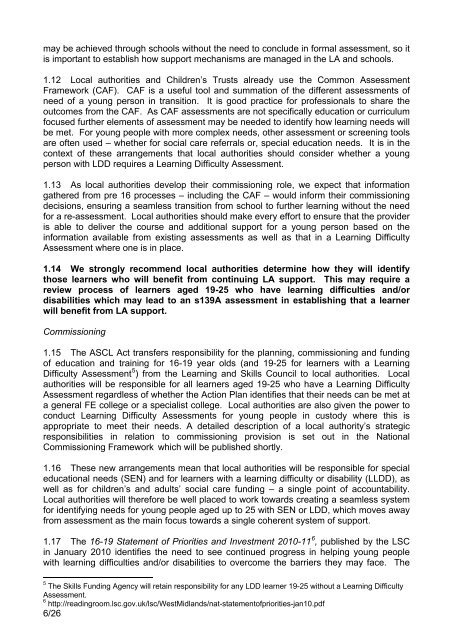Supporting young people with learning difficulties to participate and ...
Supporting young people with learning difficulties to participate and ...
Supporting young people with learning difficulties to participate and ...
Create successful ePaper yourself
Turn your PDF publications into a flip-book with our unique Google optimized e-Paper software.
may be achieved through schools <strong>with</strong>out the need <strong>to</strong> conclude in formal assessment, so it<br />
is important <strong>to</strong> establish how support mechanisms are managed in the LA <strong>and</strong> schools.<br />
1.12 Local authorities <strong>and</strong> Children’s Trusts already use the Common Assessment<br />
Framework (CAF). CAF is a useful <strong>to</strong>ol <strong>and</strong> summation of the different assessments of<br />
need of a <strong>young</strong> person in transition. It is good practice for professionals <strong>to</strong> share the<br />
outcomes from the CAF. As CAF assessments are not specifically education or curriculum<br />
focused further elements of assessment may be needed <strong>to</strong> identify how <strong>learning</strong> needs will<br />
be met. For <strong>young</strong> <strong>people</strong> <strong>with</strong> more complex needs, other assessment or screening <strong>to</strong>ols<br />
are often used – whether for social care referrals or, special education needs. It is in the<br />
context of these arrangements that local authorities should consider whether a <strong>young</strong><br />
person <strong>with</strong> LDD requires a Learning Difficulty Assessment.<br />
1.13 As local authorities develop their commissioning role, we expect that information<br />
gathered from pre 16 processes – including the CAF – would inform their commissioning<br />
decisions, ensuring a seamless transition from school <strong>to</strong> further <strong>learning</strong> <strong>with</strong>out the need<br />
for a re-assessment. Local authorities should make every effort <strong>to</strong> ensure that the provider<br />
is able <strong>to</strong> deliver the course <strong>and</strong> additional support for a <strong>young</strong> person based on the<br />
information available from existing assessments as well as that in a Learning Difficulty<br />
Assessment where one is in place.<br />
1.14 We strongly recommend local authorities determine how they will identify<br />
those learners who will benefit from continuing LA support. This may require a<br />
review process of learners aged 19-25 who have <strong>learning</strong> <strong>difficulties</strong> <strong>and</strong>/or<br />
disabilities which may lead <strong>to</strong> an s139A assessment in establishing that a learner<br />
will benefit from LA support.<br />
Commissioning<br />
1.15 The ASCL Act transfers responsibility for the planning, commissioning <strong>and</strong> funding<br />
of education <strong>and</strong> training for 16-19 year olds (<strong>and</strong> 19-25 for learners <strong>with</strong> a Learning<br />
Difficulty Assessment 5 ) from the Learning <strong>and</strong> Skills Council <strong>to</strong> local authorities. Local<br />
authorities will be responsible for all learners aged 19-25 who have a Learning Difficulty<br />
Assessment regardless of whether the Action Plan identifies that their needs can be met at<br />
a general FE college or a specialist college. Local authorities are also given the power <strong>to</strong><br />
conduct Learning Difficulty Assessments for <strong>young</strong> <strong>people</strong> in cus<strong>to</strong>dy where this is<br />
appropriate <strong>to</strong> meet their needs. A detailed description of a local authority’s strategic<br />
responsibilities in relation <strong>to</strong> commissioning provision is set out in the National<br />
Commissioning Framework which will be published shortly.<br />
1.16 These new arrangements mean that local authorities will be responsible for special<br />
educational needs (SEN) <strong>and</strong> for learners <strong>with</strong> a <strong>learning</strong> difficulty or disability (LLDD), as<br />
well as for children’s <strong>and</strong> adults’ social care funding – a single point of accountability.<br />
Local authorities will therefore be well placed <strong>to</strong> work <strong>to</strong>wards creating a seamless system<br />
for identifying needs for <strong>young</strong> <strong>people</strong> aged up <strong>to</strong> 25 <strong>with</strong> SEN or LDD, which moves away<br />
from assessment as the main focus <strong>to</strong>wards a single coherent system of support.<br />
1.17 The 16-19 Statement of Priorities <strong>and</strong> Investment 2010-11 , published by the LSC<br />
in January 2010 identifies the need <strong>to</strong> see continued progress in helping <strong>young</strong> <strong>people</strong><br />
<strong>with</strong> <strong>learning</strong> <strong>difficulties</strong> <strong>and</strong>/or disabilities <strong>to</strong> overcome the barriers they may face. The<br />
5 The Skills Funding Agency will retain responsibility for any LDD learner 19-25 <strong>with</strong>out a Learning Difficulty<br />
Assessment.<br />
6 http://readingroom.lsc.gov.uk/lsc/WestMidl<strong>and</strong>s/nat-statemen<strong>to</strong>fpriorities-jan10.pdf<br />
6/26<br />
6
















